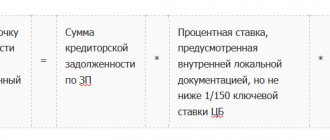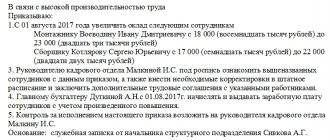Indexation rules will be approved at the federal level
Over the past few years, trade unions have been raising the issue of the need to introduce a specific mechanism for compensating wages for the inflation recorded at the end of the year. This year, the head of the Federation of Independent Trade Unions of Russia, Mikhail Shmakov, demanded that an increase:
- was of a proactive nature;
- was annual;
- compiled the forecast value of the consumer price index;
- applied to all employees, regardless of what organization they work for - commercial or government.
According to him, despite the fact that the Labor Code of the Russian Federation stipulates the obligation of employers to raise wages for employees, there is no algorithm for this procedure. Therefore, many companies either pay the minimum wage or increase payments slightly. To stop this practice, the Federation of Trade Unions proposes to specify in the Labor Code of the Russian Federation exactly how compensation should be carried out. Then, regardless of whether the employer has documents establishing the procedure for indexing wages or not, all employees will receive more.
The unions are also insisting that there should be a separate penalty for refusing to increase payments. There is no word yet on the size of the fines.
We haven’t heard anything from government officials either: officials are avoiding a direct response to the demands of the trade unions. At the same time, the president insists on building effective interaction with representatives of workers and employers, so it is possible that a working group will meet in the near future and come up with a mechanism for increasing employee salaries that will be convenient, if not for all, then at least for 2 out of 3 interested parties. We will see whose interests will suffer this time very soon.
After indexing
An increase in salary affects the amount of benefits associated with it.
Let's look at an example of how indexation will affect the amount of payments accrued to an employee.
Example
Salary of an employee of CJSC “Construction Company “Russian House”” R.A. Loseva - 20,000 rubles. Every month, in addition to salary accruals, the employee receives:
—a bonus for fulfilling the plan in the amount of half the salary, taking into account the time worked;
- Award for product quality. It is set in the range from 10 to 30% of the salary. The bonus is awarded subject to the fulfillment of the production volume plan and does not depend on the actual time worked. When choosing a specific value, the percentage of defects allowed is taken into account. If the defect is less than 1%, then 30% of the salary, from 1 to 2% - 20%, from 2 to 4% - 10%, over 4% - no bonus;
- bonus for mentoring - 3000 rubles. per month in proportion to the actual time worked.
According to the collective agreement, starting from January 1, 2012, the salaries of all employees were indexed by 6.1%. What amount will the accountant accrue to the employee for February 2012, if it is known that the month was not fully worked (out of 20 working days, only 19), while the production plan was fulfilled, the share of defects was 1.1%?
Solution
First, we determine the salary amount after indexation. It is equal to 21,220 rubles. (RUB 20,000 * 1,061).
For February the employee will be accrued:
—salary—20,159 rub. (RUB 21,220: 20 working days * 19 working days);
—bonus for fulfilling the plan—RUB 10,079.5. (RUB 21,220 * 50%: 20 working days * 19 working days);
—award for product quality—RUB 4,244. (RUB 21,220 * 20%);
— bonus for mentoring — 2850 rubles. (3000 rubles: 20 working days * 19 working days).
The total salary for February will be 37,332.5 rubles. (RUB 20,159 + RUB 10,079.5 + RUB 4,244 + RUB 2,850).
What is salary indexation?
The current labor legislation provides for measures to increase the level of real wages associated with inflationary growth in consumer prices for goods and services. In particular, this is provided for in Article 134 of the Labor Code of the Russian Federation.
The legislator associates the need for compensation with a decrease in the purchasing power of the employee, when rising prices force him to spend more, but the amount of wages does not change. As a result, the worker’s standard of living decreases, which is unacceptable. Wage indexation, by its legal nature, is a state guarantee for the remuneration of workers (Article 130 of the Labor Code of the Russian Federation) and, by virtue of the requirements of Articles 130 and 134 of the Labor Code of the Russian Federation, must be provided to all persons working under an employment contract (Definition of the Constitutional Court of the Russian Federation dated 06/17/2010 No. 913-О-О).
Since the mentioned price increase is due to inflation, in calculating the amount of compensation, the indicator used is the consumer price index (CPI), which is determined by Rosstat of the Russian Federation on the basis of Resolution No. 23 of March 25, 2002 “Basic provisions on the procedure for monitoring consumer prices and tariffs... and determining consumer price index".
The choice of CPI indicator depends on the indexing option used by the employer:
- retrospective indexation (CPI for the past period, taking into account the current price level);
- predictive indexation (CPI based on the planned level of prices, tariffs).
Regulations on the procedure for wage indexation (sample 2).
Regulations on the procedure for wage indexation
1. GENERAL PROVISIONS
1.1. This Regulation on the procedure for wage indexation (hereinafter referred to as the “Regulation”) in ______________________________ (hereinafter referred to as the “employer”) was developed in accordance with Art. 134 of the Labor Code of the Russian Federation, other regulatory legal acts of the Russian Federation.
1.2. Wage indexation (hereinafter referred to as “indexation” and “salary”) ensures an increase in the level of real wages of employees of a given employer.
1.3. Indexation is carried out at least _____ times a year.
1.4. The reasons for indexing are:
1.4.1. Changes in the minimum wage established by law.
1.4.2. Change in the legal minimum subsistence level per capita for the working population in the constituent entity of the Russian Federation at the location of the employer.
1.4.3. Changes in the consumer price index for the quarter (half year, year), published in (on) ____________________________.
1.4.4. Reasons agreed upon by employees and employer in a collective agreement, collective agreements, or local regulations established by the employer.
1.4.5. In other cases established by current legislation.
In the case of simultaneous action of several causes, indexing is carried out only by one of them with the indicator of the largest (or smallest) change (or by the average change in such causes).
1.5. The size of the index is established by local regulations and is not lower or higher than the value determined by the reason for indexing (clause 1.4 of the Regulations).
1.6. Indexation is a change in the terms of remuneration, carried out by the employer taking into account the motivated opinion of employee representatives within the time limits provided for by labor legislation and other acts containing labor law norms. Employees must be notified of such changes no later than two months in advance.
1.7. The index size comes into force and is used for calculating wages from the moment specified in the local regulatory act, but no later than ____ days from the date of approval by the employer.
1.8. The base monthly tariff rate (BMTS) of an employee of the first qualification level (employee of the lowest category) is subject to indexation.
1.8.1. Salaries derived from the BMTS are indexed in the established order of their calculation.
1.8.2. Payments accrued regardless of the BMTS are indexed from their original amount in effect at the time of indexation.
1.8.3. Bonuses, allowances, additional payments, compensation ________________________________ (are not subject to indexation / are indexed simultaneously with salaries / are indexed depending on the financial and economic condition of the employer, which is determined by liquidity ratios, solvency indicators and profitability indicators).
1.9. A delay in indexation is equivalent to a delay in wages.
1.10. Indexation is prohibited if signs of insolvency (bankruptcy) of the employer are revealed.
1.11. Indexation is not carried out during periods _____________________________________
(mass layoffs of workers/after the start of the procedure for reorganization or liquidation of the employer/tax audits and/or labor inspection inspections.)
1.12. Employee representatives for the purposes of these Regulations are _______
__________________________ (primary trade union organization/ persons elected to conclude a collective agreement/ persons specially elected by the labor collective/ or indicate other persons).
2. INDEXATION PROCEDURE
2.1. The HR department, together with the labor and wages department, quarterly before the __ day of the first month following the end of the quarter, determine the presence or absence of reasons for indexation and, if there are reasons specified in clause 1.4 of the Regulations, submit reasonable proposals to the employer with calculation of the indexation amount.
2.2. The employer, taking into account its financial and economic condition, within __ days considers the proposals received from the HR department and, with its reasoned conclusion on the possibility or impossibility of indexation, submits a draft local regulatory act on indexation or on a temporary deviation from indexation for discussion by employee representatives.
2.3. Employee representatives, within __ days, review the draft local regulatory act submitted to them on indexation or on a temporary deviation of indexation and, taking into account the opinions of employees, formulate their informed judgment with its subsequent transfer to the employer.
2.4. The employer, taking into account the reasonable judgment of employee representatives, approves a local regulatory act on indexation or a temporary deviation from indexation.
2.5. An approved local regulatory act on indexation or a temporary deviation from indexation is one of the grounds for calculating wages, bonuses, allowances, additional payments, and compensations.
3. OTHER PROVISIONS
3.1. Persons involved in the implementation of these Regulations bear personal responsibility for its failure to comply or violation.
3.2. Changes and additions are made to these Regulations in the manner established by local regulations on office management.
Head of HR Department: _________/__________/
Head of Labor and Payroll Department: _________/__________/
The following have been familiarized with this Regulation:
Who should index and when?
Salary indexation in 2021, if the company has not developed its own sample regulations for wage indexation, is carried out on the same as previously, the conditions of Article 134 of the Labor Code of the Russian Federation: state bodies, local governments, state and municipal institutions make compensation in the manner established by federal, regional and local legislation, other employers - in the manner established by the collective agreement, agreements, local regulations.
Thus, currently the labor legislation of the Russian Federation does not provide for a uniform method of compensation for wages for all employees. This procedure is regulated depending on the source of financing, the form of ownership of the employer (state, non-state) and is based not only on the level of inflation in the country, but also on other indicators enshrined in the relevant laws and regulations.
Indexation for employees who work in the non-state sector of the economy is carried out on the basis of local regulations of their employers (collective agreement, agreement, regulation, order, etc.).
Employers who are financed from the budget index wages in the manner approved by current legislation, including industry agreements (if they specify the specified procedure). Moreover, the industry agreement applies to employers from the date of official publication of the proposal to join, and if the employer does not refuse to join it (Part 9 of Article 48 of the Labor Code of the Russian Federation), then it must bring its local acts into compliance with the requirements of the agreement.
You don't have to index it, but you should increase it
Even a cursory analysis of judicial practice reveals many disputes between employers and employees regarding wage indexation. Often, employees go to court with a demand to force indexation or to recover wages from the employer taking into account indexation, etc. However, in the vast majority of cases, the courts refuse to satisfy the demands.
So, for example, S. went to court with a demand to recognize the employer’s actions as discriminatory, since since 2014 they have not carried out salary indexation. The plaintiff also asked to oblige the employer to make changes to the employment contract and establish a different salary (Appeal ruling of the Investigative Committee for civil cases of the Moscow City Court dated October 16, 2021 in case No. 33-37799/2017). The demands were denied: the employer, as the court indicated, is a commercial organization and has the right to carry out indexation at its own discretion in the manner established by the LNA, a collective or labor agreement; the issue falls within the exclusive competence of the employer, and the court has no right to oblige the plaintiff to change the salary.
In another case, the employee asked to recover wages taking into account indexation, but the court refused this too, arguing that the LNA presented by the defendant-employer did not provide for indexation (Appeal ruling of the Investigative Committee for civil cases of the Supreme Court of the Udmurt Republic dated March 29, 2021. in case No. 33-1455/2017).
Such decisions can be cited for a very long time, and employers who undoubtedly know about such practices conclude that they are not obligated to carry out any indexation at all.
Salary indexation for public sector employees in 2021
State bodies compensate wages in the manner and according to the rules established by labor legislation and other regulations containing labor law norms.
Federal Law No. 384-FZ dated December 1, 2014 “On the federal budget for 2015 and for the planning period of 2021 and 2021” established an increase in wages for public sector workers and federal civil servants from October 1, 2015 by 5.5% (for with the exception of certain categories). However, another Federal Law dated April 20, 2015 No. 93-FZ “On Amendments to the Law dated December 1, 2014 No. 384-FZ” canceled this indexation.
Will there be salary indexation for public sector employees in 2021? It is already known that this is planned. The government decided that from October 1, 2019, the salaries of several million Russian state employees who were not covered by the “May decrees” will increase by 4.3%.
How to write an order correctly
Existing regulations do not define any special form of document for this order. The order can be drawn up on company letterhead, or in any form on regular letterhead, but with the mandatory inclusion of all necessary details.
At the top, in the header of the order, the name of the organization, registration codes, as well as the address of the business entity are indicated.
This is followed by an indication of the name of the “Order” form, and next to it is the serial number of the document. This number is necessary in the future to search for this document, since it will be its registration identifier.
A summary of the order should be indicated below as a heading. For example, “On wage indexation.”
The next line indicates the date the document was drawn up and the place of its signing (name of the locality).
After this, you need to start drawing up the introductory part of the document.
A reference to the normative act must be made here:
- To Article 134 of the Labor Code of the Russian Federation.
- To the local act of the business entity itself, which regulates the indexation process at the enterprise.
This is followed by the administrative part of the document, which begins with the words “I ORDER” and includes:
- The director's order to index employees' salaries by a certain conversion factor. The value of this indicator can be recorded by order of the manager or reflected in a local act of a regulatory nature.
- Order on the development and implementation of a new staffing table. This order may be issued as a separate order. Information about this is then omitted from this document.
- The payment department specialists are instructed to follow this order when determining the remuneration of employees for their work. In this part, you also need to determine from which month the salary will be accrued in an increased amount.
- Assigning control functions over the execution of this order to a certain official.
It is important to take into account the following: if a new staffing table is indexed and put into effect by one order, then this local act must go to the order as an appendix.
This order must be endorsed by the director of the organization.
Further, all persons of the company who were mentioned in this document must affix their signatures as confirmation that they are familiar with the contents of this order.
Registration of indexing
Unlike public sector employees, employers from the non-state sector of the economy need to establish the procedure for indexing wages in the organization. Adjustment mechanism:
- It can be described in a separate local act - a provision on wage indexation, which complies with the norms of the Labor Code of the Russian Federation and acts independently.
- Or it is prescribed in the wage regulations. An example of wage indexation in a wage regulation is discussed in detail in the article “How to draw up a wage regulation.”
- Another option is to make the procedure for indexing wages in the organization part (an appendix) of the collective agreement.
Chapter 7 of the Labor Code of the Russian Federation specifies the procedure by which the rules for compensation are established in collective agreements. If there is no such agreement or there is no corresponding rule in it, then the employer has the right to adopt a separate regulatory act containing the necessary rules. Article 8 of the Labor Code of the Russian Federation establishes the requirement that the adoption of a local act must be agreed upon with a representative body of workers (for example, a trade union organization). The procedure for taking into account the opinion of the trade union organization when adopting local regulations is regulated in Art. 372 Labor Code of the Russian Federation. It is important to take these points into account before prescribing wage indexation in the wage regulations or a separate LNA.
How to implement a salary increase procedure
The procedure is not described in the law, but there are several rules that must be remembered when you are developing a regulation on wages (indexation) or a separate document for these purposes:
- indexation applies to all employees;
- so that there are no complaints from regulatory authorities, the percentage increase must be no less than inflation (this indicator is approved annually by Rosstat, and the government uses it to increase government payments: benefits, pensions, allowances for military personnel). But this is only a recommendation; the employer chooses the specific value;
- The company must have a regulation on wage indexation (you can create a sample document yourself or use our template) or another regulatory act that spells out the entire mechanism for increasing employee payments. After all, its absence does not mean that the employer should not index wages: the company can be forced to raise payments in court. The document must be required only in commercial companies; state and municipal companies do not require it.
We also draw your attention to the fact that indexation can be carried out either through a real increase in all wages (or part of it, for example, only the salary), or through the payment of bonuses. This was stated in the Review of Judicial Practice of the Supreme Court of the Russian Federation No. 4 for 2017 (approved by the Presidium of the Supreme Court of the Russian Federation on November 15, 2021)
How to develop a document
A sample regulation on wage indexation 2021 must contain a detailed algorithm for calculating amounts and the procedure for determining the corresponding coefficients. Usually they focus on one of several indicators established by the state:
- consumer price index (published on the official website of Rosstat of the Russian Federation);
- inflation rate (annually fixed in federal and regional laws);
- growth of the living wage of the working population (established by the Government of the Russian Federation and regional laws).
In addition to the calculation indicators, the regulations must indicate the period and timing (quarterly, salary indexation per year) and other necessary conditions, including:
- record which payments are subject to compensation;
- determine the calculation formula and rules for determining coefficients;
- establish the period from which the new amounts are applied;
- indicate a list of documents that should reflect the results of indexation (regulations on remuneration, staffing, employment contracts, etc.);
- identify the officials responsible for its implementation;
- consolidate the procedure for agreeing on the situation with representatives of the labor collective (trade union).
It is also important to indicate the conditions under which compensation is not provided or will be limited (for example, financial and economic problems with the employer). If they are not included in the text of the regulation, the employer will not be able to unilaterally reduce the amount of compensation or refuse indexation altogether. We recommend a new regulation on wage indexation; it will allow you to focus on proven, correct formulations.
Having completed all the above procedures and approvals, the employer issues an order on salary indexation, with the release of which the provision comes into force from the date specified in it.
After the order is issued, the text of the regulation must be brought to the attention of all employees.
Regulations on wage indexation in the organization: sample 2020
After establishing a new wage level, this fact must be recorded by concluding additional agreements with employees to existing employment contracts.
Salary increase in 2021 in commercial organizations
Despite the fact that the procedure for indexing wages has not been established at the legislative level, Rostrud believes that this does not exempt the employer from carrying it out (letter dated December 24, 2018 No. 14-1/OOG-10305). Commercial organizations must check whether they have employees who receive less than the new minimum wage for a full month from January 1, 2021 - 11,280 rubles. If there are such people, their salaries must be raised, otherwise the company will be fined.
To increase employee salaries to the new minimum wage, you should issue an order from the manager and sign an additional agreement with the employees. This should be done in December 2021, since from January 1, wages must be calculated from the new minimum wage. See below for a sample order.
Sample order for a salary increase in 2021 due to a change in the minimum wage
If an employee often travels on business trips, there is no need to take into account per diem when setting monthly salary. In addition, 11,280 rubles cannot include gifts, financial assistance, etc. These incomes do not apply to wages.
Employer's liability
A sample regulation on wages and wage indexation and compliance with the standards provided for in it will eliminate disputes and proceedings, since the court will oblige an increase if there is no document. In case of violation of labor legislation and other regulatory legal acts containing labor law norms, the employer faces a warning or a fine (Part 1 of Article 5.27 of the Code of Administrative Offenses of the Russian Federation):
- for officials - in the amount of 1000 to 5000 rubles;
- for persons carrying out entrepreneurial activities without forming a legal entity - from 1000 to 5000 rubles;
- for legal entities - from 30,000 to 50,000 rubles.
If the documentation is approved, but there is a violation or failure to fulfill obligations under it, the employer faces a warning or a fine (Article 5.31 of the Code of Administrative Offenses of the Russian Federation) in the amount of 3,000 to 5,000 rubles.
What is subject to indexing
Labor standards establish that indexation should be carried out in relation to remuneration for workers, and do not determine which parts need to be revised. Therefore, it is believed that the increase factor should be applied to all types of accruals included in the salary. That is, salaries, bonuses, additional payments and allowances need to be indexed.
However, if a company states in its local act that only salaries should be indexed, then it has the right to increase only this part, because all other components, as a rule, are set in some ratio to the salary, and will be increased accordingly.
You might be interested in:
Order to amend the vacation schedule: how to draw it up correctly
Erroneously, some business entities believe that establishing a new surcharge or increasing the premium can be regarded as indexation. The regulatory authorities will not consider this indexation, since indexation is an obligation, and payment of bonuses is a right, and therefore the company can be held administratively liable in accordance with the Administrative Code.





